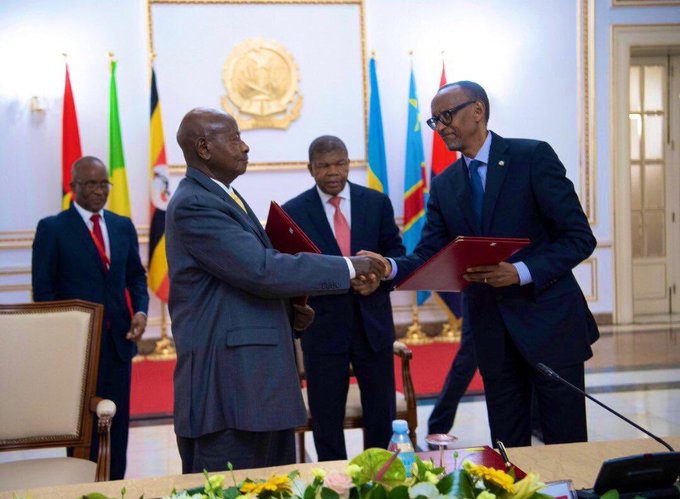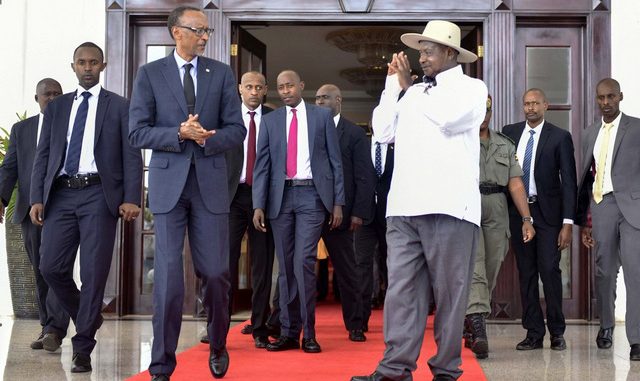Rwanda President Gen. Paul Kagame on Friday dashed any hope for an end to the nearly yearlong diplomatic fallout with Uganda by reiterating his strong accusations against the Government of Uganda.
There had been slim hopes of an end to the bitter diplomatic spats – that saw Kigali close its borders with Uganda in February last year – when officials from the two countries sat at the dais in Angola to diffuse the tensions and find amicable solutions to the problem.
The hope had been galvanised on September 16 when Foreign Affairs minister Sam Kuteesa led a high profile delegation from Uganda for talks in Kigali, leading to much anticipation from citizens of both countries that the borders would be reopened to allow free movement of goods and services.
However, addressing journalists from local and international media in Kigali on Friday, Kagame fanned the smouldering embers of the diplomatic fallout by laying the blame for the dispute, like he has done many times since February last year, squarely on Uganda.
“The origin of this problem is Uganda hosting negative elements who have been causing insecurity in Rwanda,” the Rwandan leader said.
Kagame, a former spymaster in five-year guerrilla war that brought the government of Yoweri Museveni in power, has maintained since last year that Uganda was harbouring Rwanda National Congress rebels led by Gen Kayumba Nyamwasa.
“There is also a problem of our citizens who are imprisoned in Uganda without trial. Those citizens who are released from prison are thrown in the middle of the night at the border,” Kagame said.
Uganda strongly denies the accusations that has mostly played out on social media, especially Twitter, where Rwandan authorities repeatedly threw the gauntlet and claimed to have evidence and confessions from captured rebels to back up their accusations.
“We have nothing to benefit in destabilising Rwanda just like I think they have nothing in destabilising Uganda. We are going to be investigating all of these allegations and we shall find a way of resolving them,” Amb Kutesa said.
The Rwandan leader also explained afresh reasons for his government slapping travel advisory on its citizens against travelling to Uganda because they claimed indiscriminate arrests.
‘But we continue to tell Ugandans that they are free to come here. If they don’t want, we don’t have any quarrel with anyone,” he said.
Asked about the status of the Angola-mediated talks to end the fallout, Kagame said officials from both countries had met in Luanda and Kigali.
“We were supposed to have another meeting in Kampala on the 16th of October but there was no communication until we later read of an invitation in papers,” he said.
Uganda Foreign Affairs permanent secretary Amb. Patrick Mugoya told media that the fallow-up meeting in Kampala is slated for Wednesday next week, but refused to be drawn into blame game on why the meeting had not taken place as planned.
The November 13 meeting could now come on a sour note after the pendulum appears to have swung back rather unpredictably with Gen Kagame’s remarks on the diplomatic fallout.
Keen observers will take note of the fact that despite recent efforts to patch the wear and tear, Kigali has not showed any desire to ease its strict monitor of the border. On Monday, some Ugandan media reported that tension had flared along the Uganda-Rwanda border of Katuna after Rwandan security officials shot two of their nationals who had allegedly crossed into Uganda to smuggle Irish potatoes.
The Monday evening incident happened 300 meters from the Ugandan border. The two had reportedly crossed into Uganda through a porous border at Rushaki in Karujanga in the Gatuna.
President Kagame appeared to have an explanation for the continued border closure and strict screening of Rwandan citizens crossing, saying Ugandan authorities have asked that the borders be reopened but that his government insists on the root cause being ironed out.
“How do you expect countries to trade when certain citizens are arrested the moment they cross the border?” he asked. “If you are talking about trade but you arrest people crossing the border points, do you want goods to just move like these driver-less vehicles?”
Although Uganda says the meeting will take place, it remained to be seen how the agenda will shape out for the memorandum of understanding drawn in Angola given the terse message from Kagame that could be interpreted as showing lack of willingness to give the talks the chance it deserves before blame games can be apportioned again after failure.
The ad hoc commission meeting in Kigal was the first aimed at following up on the implementation of the memorandum of understanding agreed upon by the two countries.
With the shooting at the border followed closely by President Kagame’s strong accusations, the talks in Kampala appear to be shaping up for a resolution for further talks. Meantime, the borders remain closed, the people of both countries affected.







